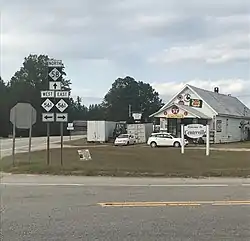Centerville, North Carolina | |
|---|---|
 | |
 Location of Centerville, North Carolina | |
| Coordinates: 36°11′12″N 78°06′41″W / 36.18667°N 78.11139°W | |
| Country | United States |
| State | North Carolina |
| County | Franklin |
| Established | 1882 |
| Incorporated | May 25, 1965[1] |
| Dissolved | July 22, 2017[2] |
| Named for | Central location of area between Louisburg, Warrenton and Littleton. |
| Area | |
| • Total | 1.65 sq mi (4.28 km2) |
| • Land | 1.63 sq mi (4.22 km2) |
| • Water | 0.02 sq mi (0.06 km2) |
| Elevation | 322 ft (98 m) |
| Population (2020) | |
| • Total | 149 |
| • Density | 91.52/sq mi (35.34/km2) |
| Time zone | UTC-5 (Eastern (EST)) |
| • Summer (DST) | UTC-4 (EDT) |
| Area code(s) | 919 and 984 |
| FIPS code | 37-11560[5] |
| GNIS feature ID | 2791522[4] |
Centerville is a census-designated place (CDP) in the rural northeastern corner of Franklin County, North Carolina, United States. The population was 149 at the 2020 census.[6] It was an incorporated town from 1965 to 2017.[2]
There is not a post office in Centerville, and thus no zip code; it simply uses that of Louisburg, which is located 12 miles (19 km) west. Centerville is centered on "the crossroads", which is the intersection of NC-561 and NC-58 and the site of two small old-fashioned general stores.
Centerville has a church, (Centerville Baptist Church, a member of the Southern Baptist Convention), and volunteer fire department. There is not a police department, so Centerville, like the surrounding unincorporated area, is patrolled by the Franklin County Sheriff's Office.
Centerville includes many antique buildings from its heyday, including the now-defunct Serepta Church, a former Methodist church located at the intersection of NC-561 and Centerville-Laurel Mill Road.
Perry School and Vine Hill are listed on the National Register of Historic Places.[7][8]
History
Centerville was established circa 1882 and named for its central location between the towns of Louisburg, Warrenton and Littleton.[9] It was incorporated in 1965, four years after the dissolution of the nearby town of Wood.[10][11]
Geography
According to the United States Census Bureau, the city has a total area of 0.3 square miles (0.78 km2), all land.
Demographics
| Census | Pop. | Note | %± |
|---|---|---|---|
| 1970 | 123 | — | |
| 1980 | 135 | 9.8% | |
| 1990 | 115 | −14.8% | |
| 2000 | 99 | −13.9% | |
| 2010 | 89 | −10.1% | |
| 2020 | 149 | 67.4% | |
| U.S. Decennial Census[12] | |||
2020 census
| Race | Number | Percentage |
|---|---|---|
| White (non-Hispanic) | 116 | 77.85% |
| Black or African American (non-Hispanic) | 3 | 2.01% |
| Native American | 1 | 0.67% |
| Asian | 0 | 0% |
| Other/Mixed | 15 | 10.07% |
| Hispanic or Latino | 14 | 9.4% |
As of the 2020 United States census, there were 149 people, 103 households, and 85 families residing in the CDP.
2010 census
As of the census[5] of 2010, there were 89 people residing in what was then a town. The racial makeup of the town was 93% White (83 persons), 3.5% Black (3 persons), and 3.5% other (3 persons).
Dissolution
On February 22, 2017, a bill was filed in the North Carolina General Assembly seeking legislative approval for dissolution of the Town of Centerville. The Centerville Town Council voted unanimously in their January meeting to dissolve the town charter due to Centerville's lack of growth and its financial inability to continue as a municipality.[11] When the bill is passed, the town will have 30 days to pay off its bills and liquidate its assets. Under the legislation, any remaining money would be given to Centerville Fire Department.[11] Senate Bill 122, regarding the dissolution of the Town of Centerville, was ratified by the North Carolina General Assembly on June 22, 2017.[14][2] The town officially dissolved on July 22, 2017.[2]
References
- ↑ North Carolina General Assembly, House Bill 878, Incorporation of the Town of Centerville, 1965 Session, Retrieved Apr. 11, 2017.
- 1 2 3 4 Senate Bill 122, North Carolina General Assembly, Retrieved Jul. 6, 2017.
- ↑ "ArcGIS REST Services Directory". United States Census Bureau. Retrieved September 20, 2022.
- 1 2 U.S. Geological Survey Geographic Names Information System: Centerville, North Carolina
- 1 2 "U.S. Census website". United States Census Bureau. Retrieved January 31, 2008.
- ↑ United States Census
- ↑ "National Register Information System". National Register of Historic Places. National Park Service. July 9, 2010.
- ↑ "National Register of Historic Places Listings". Weekly List of Actions Taken on Properties: 1/03/11 through 1/07/11. National Park Service. January 14, 2011.
- ↑ William S. Powell, The North Carolina Gazetteer: A Dictionary of Tar Heel Places, 1968, The University of North Carolina Press at Chapel Hill, ISBN 0-8078-1247-1, Library of Congress Catalog Card #28-25916, page 98. Retrieved Jan. 15, 2015.
- ↑ Franklin County, North Carolina Communities, Retrieved Jan. 15, 2015.
- 1 2 3 WRAL Channel 5, Franklin County town dissolves charter, melts into county by Bryan Mims, February 23, 2017, Retrieved Apr. 11, 2017.
- ↑ "Census of Population and Housing". Census.gov. Retrieved June 4, 2015.
- ↑ "Explore Census Data". data.census.gov. Retrieved February 18, 2022.
- ↑ North Carolina General Assembly, Senate Bill 122, List of Chamber Actions, Retrieved Apr. 12, 2017.
- William S. Powell, The North Carolina Gazetteer: A Dictionary of Tar Heel Places, 1968, The University of North Carolina Press at Chapel Hill, ISBN 0-8078-1247-1, Library of Congress Catalog Card #28-25916, page 98. Retrieved Jan. 15, 2015.
